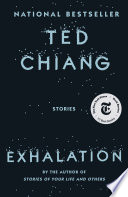Part 2
Ted Chiang's *Exhalation* is a collection of amazing short stories that feel like stepping into different worlds, each one exploring big, mind-bending questions about life, the universe, and everything! It's not your typical sci-fi with spaceships blasting off – instead, Chiang uses cool ideas and "what if" scenarios to make you think really hard.
Imagine a world where you could step through a door and meet different versions of yourself, each living a totally different life. That's "The Merchant and the Alchemist's Gate." The main character, Robert, meets a super-rich version of himself and a dirt-poor one. It shows how even small choices, like taking a different job or saying yes to an opportunity, can completely change your life. It's like throwing a pebble in a pond – the little ripple spreads out and makes huge waves. This story makes you wonder: Is your life already written, or do you really have free will to choose your own path?
Then there's "Anxiety is the Dizziness of Freedom," where people can choose what they believe, like picking flavors at an ice cream shop. But what happens when you choose a belief that isn't true? The story follows Natalia, who picks a belief that makes her feel safe and happy, even though it's not real. It's like wearing special glasses that only show you the pretty parts of the world, but you miss out on the whole picture. This story teaches us that believing things just because they feel good isn't always the best way to live. Sometimes, facing the truth, even if it's scary, is better in the long run. It also shows how our beliefs affect how we treat others.
The title story, "Exhalation," is a real brain-teaser! It's about beings who breathe a special air that slowly runs out. As they breathe, they learn more about the world, but as the air gets used up, they start to lose their understanding. It's like watching a candle burn down – the flame gets smaller and the light changes. This story explores life, death, and what it means to be conscious. It makes you think about what happens after we die and whether there's more to life than what we can see and understand. It's a bit like a puzzle box that keeps you thinking long after you've finished reading.
"The Great Silence" is like a space detective story. It's about finding alien civilizations, but they're all strangely quiet, unable to communicate with each other. It's like trying to have a conversation with someone who speaks a completely different language and has different ways of understanding the world. This story shows how hard it is to understand others, even if they seem similar to us. It makes you think about how we communicate and what happens when communication breaks down. It also highlights the vastness of space and the possibility of other life forms out there.
Chiang also has a story about a man who finds a way to make perfect copies of himself and what happens when those copies make their own choices. This explores the concept of identity – are we just our experiences, or is there something more fundamental about who we are? Another story involves a woman who is given a device that allows her to experience a future where she made different choices, but the experience is emotionally painful. This again touches on the themes of free will and the consequences of our decisions. He even explores the nature of stories themselves in a fascinating and meta way, making you think about how we create and understand narratives.
All of Chiang's stories in *Exhalation* are like little thought experiments, using science fiction to explore big philosophical questions. He doesn't give you easy answers, but he makes you think deeply about what it means to be human, to make choices, and to understand the world around us.
Lesson
Ted Chiang's *Exhalation* teaches us that even seemingly small choices can have enormous consequences, and that understanding ourselves and the world around us is a continuous process of questioning, learning, and accepting the uncertainties of life. It encourages us to think critically about our beliefs, our actions, and the nature of reality itself. It's a reminder that even the biggest questions, like the meaning of life and death, are worth pondering, and that exploring these questions can lead to a deeper understanding of ourselves and the universe.
